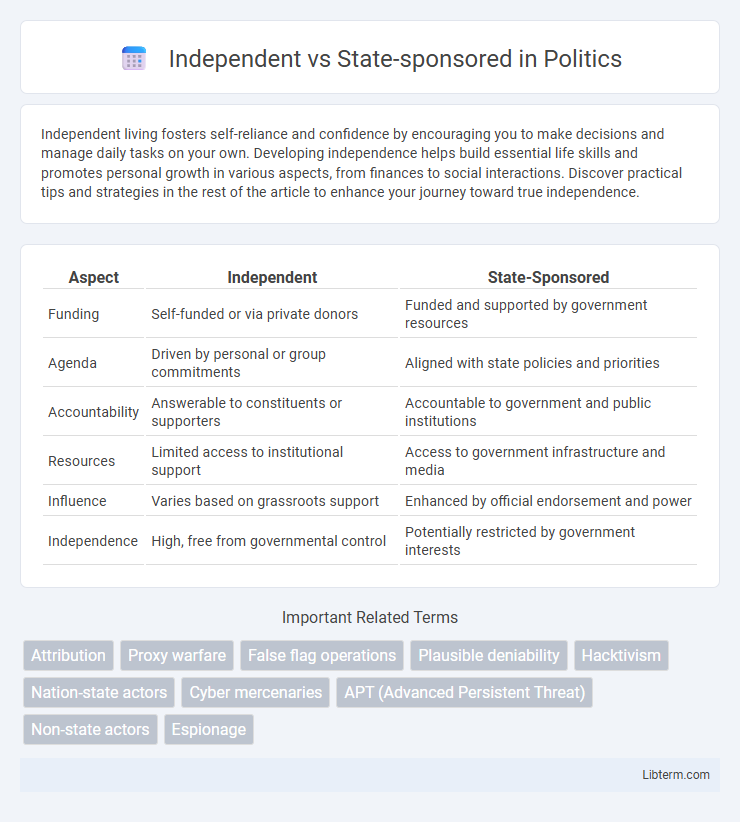Independent living fosters self-reliance and confidence by encouraging you to make decisions and manage daily tasks on your own. Developing independence helps build essential life skills and promotes personal growth in various aspects, from finances to social interactions. Discover practical tips and strategies in the rest of the article to enhance your journey toward true independence.
Table of Comparison
| Aspect | Independent | State-Sponsored |
|---|---|---|
| Funding | Self-funded or via private donors | Funded and supported by government resources |
| Agenda | Driven by personal or group commitments | Aligned with state policies and priorities |
| Accountability | Answerable to constituents or supporters | Accountable to government and public institutions |
| Resources | Limited access to institutional support | Access to government infrastructure and media |
| Influence | Varies based on grassroots support | Enhanced by official endorsement and power |
| Independence | High, free from governmental control | Potentially restricted by government interests |
Introduction to Independent vs State-sponsored Initiatives
Independent initiatives operate without direct government control, driven by private organizations, individuals, or communities aiming to address specific issues or innovate freely. State-sponsored initiatives are funded and managed by government bodies, aligning projects with national policies, regulations, and strategic objectives. The distinction lies in autonomy, funding sources, and accountability, influencing the scope, scale, and impact of each initiative.
Defining Independent Operations
Independent operations refer to covert or overt actions executed by non-state actors or individuals without direct governmental control or sponsorship, often driven by personal, ideological, or financial motivations. These operations contrast with state-sponsored activities that are formally directed, funded, and designed to advance a nation's political or strategic interests. Understanding independent operations is crucial for distinguishing unauthorized or grassroots movements from coordinated efforts backed by national intelligence or military resources.
Overview of State-sponsored Endeavors
State-sponsored endeavors in cybersecurity involve government-backed initiatives aimed at advancing national interests through cyber operations, including espionage, sabotage, and information warfare. These activities are typically coordinated by intelligence agencies or military cyber units, leveraging substantial resources and sophisticated technology to target foreign governments, critical infrastructure, or private sector entities. Unlike independent hackers, state-sponsored actors operate under official mandates, enabling them to conduct long-term, strategically aligned campaigns with significant geopolitical implications.
Key Differences Between Independent and State-sponsored Activities
Independent activities are typically conducted by non-governmental individuals or groups driven by personal, financial, or ideological motives, operating without direct support or endorsement from any state entity. State-sponsored activities involve coordinated efforts funded, managed, or sanctioned by a government aiming to advance national interests, often through intelligence agencies or military units. Key differences include the scale of resources, accountability, and strategic objectives, with state-sponsored actions being more organized and politically motivated compared to the often decentralized and opportunistic nature of independent actions.
Advantages of Independent Efforts
Independent efforts offer unparalleled agility in responding to emerging threats without bureaucratic delays commonly experienced in state-sponsored initiatives. These operations benefit from the ability to innovate rapidly, leveraging cutting-edge technologies and unconventional tactics free from political constraints. Such autonomy enables more discreet and flexible actions that can adapt swiftly to the dynamic landscape of cybersecurity and intelligence gathering.
Benefits of State-sponsored Support
State-sponsored support offers access to extensive resources, including advanced technology and intelligence networks, enhancing operational capabilities and success rates in cyber activities. This backing provides financial stability and legal protection, enabling more sustained and organized efforts compared to independent actors. Collaboration with government agencies facilitates strategic alignment with national objectives, increasing the impact and scope of initiatives.
Challenges Faced by Independents
Independent entities face significant challenges, including limited access to funding and resources compared to state-sponsored counterparts, which hinders their ability to scale operations and sustain long-term projects. They also struggle with legitimacy and influence in policy-making arenas, often lacking the political connections and institutional support that state-sponsored entities leverage effectively. Furthermore, independents encounter difficulties in ensuring security and operational stability, as they may not benefit from state-backed protection or intelligence networks.
Risks Associated with State-sponsored Involvement
State-sponsored cyber activities pose heightened risks due to substantial resources, sophisticated tools, and intelligence capabilities backing their operations, making attacks more persistent and difficult to detect. These actors often target critical infrastructure, government networks, and private sectors to achieve geopolitical objectives, increasing the potential for widespread disruption and espionage. Unlike independent hackers motivated by financial gain or personal challenge, state-sponsored groups operate under directives aligned with national interests, intensifying the scale and impact of their cyber threats.
Case Studies: Independent vs State-sponsored Examples
Independent cyberattacks commonly originate from individual hackers or non-state groups targeting various sectors for personal gain or ideological reasons, such as the 2013 Target data breach conducted by a cybercriminal group. State-sponsored cyber operations are typically orchestrated by national governments aiming to advance geopolitical interests or gather intelligence, exemplified by the Stuxnet worm attack attributed to the U.S. and Israel targeting Iran's nuclear program. These case studies highlight distinctive objectives, resources, and impacts, contrasting lone cybercriminal exploits against coordinated nation-state cyberwarfare efforts.
Conclusion: Balancing Independence and State Sponsorship
Balancing independence and state sponsorship requires a nuanced approach that respects artistic freedom while leveraging resources and support. Independent creators often enjoy greater creative control, but state-sponsored initiatives provide valuable funding and infrastructure that can elevate projects. Striking a balance enables sustainable growth while preserving authenticity and innovation in creative industries.
Independent Infographic

 libterm.com
libterm.com